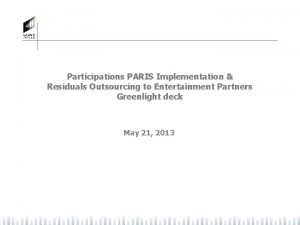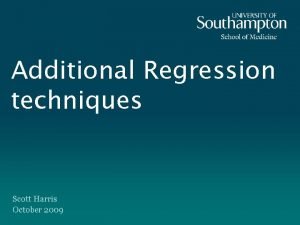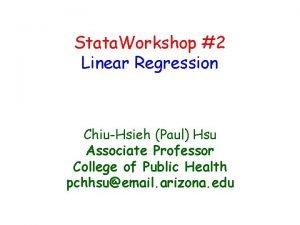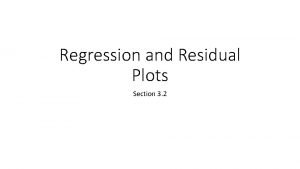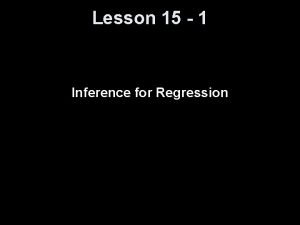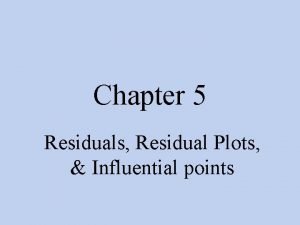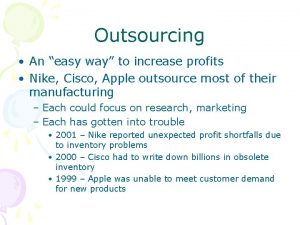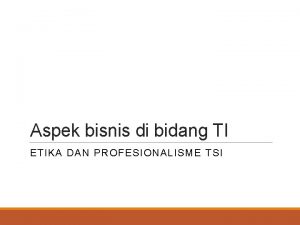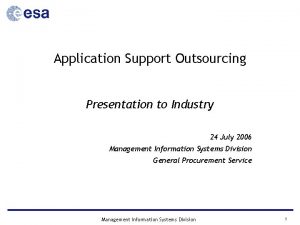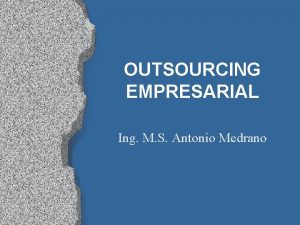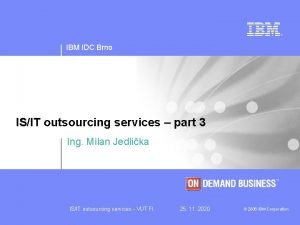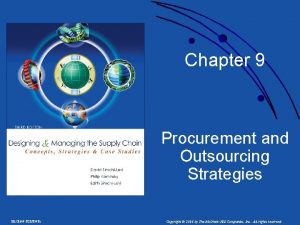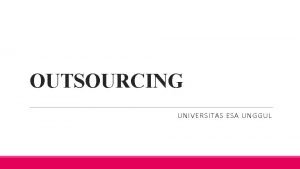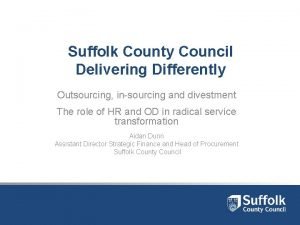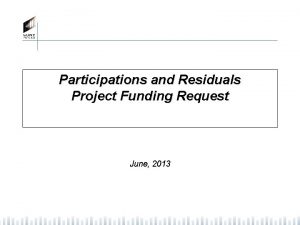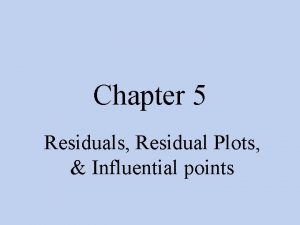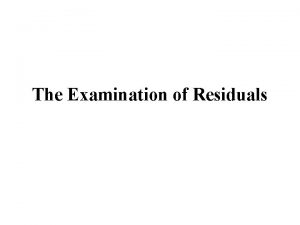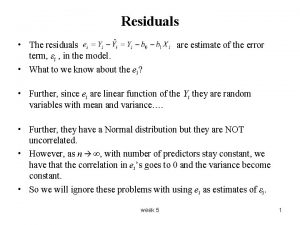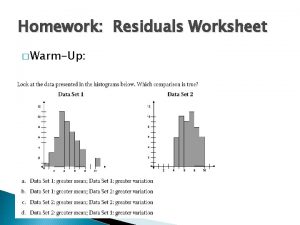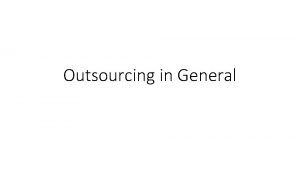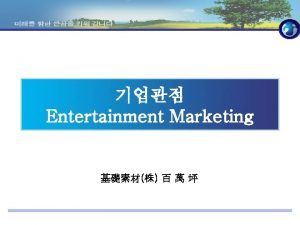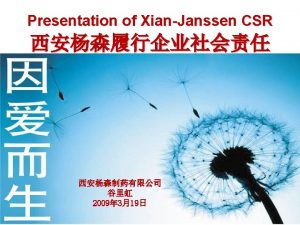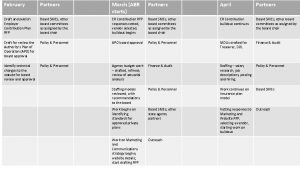PARIS for Participations Entertainment Partners for Residuals Outsourcing


















- Slides: 18

PARIS for Participations & Entertainment Partners for Residuals Outsourcing Green light deck February XX, 2013

Agenda ►Executive Summary ►Business Problem Statement ►Inception Phase Status Update ►PARIS for Participations - Assessment ►PARIS for Participations - Project Plan ►PARIS for Participations - Financials ►EP for Residuals Outsourcing - Assessment ►EP for Residuals Outsourcing - Project Plan ►EP for Residuals Outsourcing - Financials ► 10 -year Cost Benefit Analysis ►Project Funding Needs Draft for discussion 2

Executive Summary • The Participations and Residuals systems are outdated, lack integrations with key enterprise systems and promote many manual, in-efficient and error prone processes increasing the risk of inaccurately paying the Participants and the Talents (Guilds). • The total estimated cost to convert Participations to NBCU PARIS and outsource Residuals to Entertainment Partners is estimated at approximately $14. 9 M. Draft for discussion 3

Problem Statement – Participations ● Very manual, time-consuming and inefficient processes are employed for Data Sourcing, Payout Calculations, Paper copying and filing. ● The OPUS system is not enabled to model participant contracts, calculate payouts and to directly generate participant statements. A mix of manual procedures and excel manipulations are employed to prepare Talent Statements. ● The volume and type of products and the complexity of talent deals are ever increasing which results in keeping up with the statement generation schedule very difficult. Additional headcounts are required to keep up with the ever growing volume of work. To deal with the work load, for the deals which are forecasted to not pay do not have statements created (i. e. statements are “bugged”) ● Upstream data sources lacking governance and consistency in usage providing data in a form that lacks the appropriate level of granularity and attributes. Lack of complete understanding of the information flowing into and filtered out of the data feeds into the department. ● Unable to focus on value-add activities (e. g. breakout projections, proactive buyout assessments, ‘What-if’ analysis, impact assessment & feedback to Business Affairs across title, market & media types). Draft for discussion 4

Problem Statement – Residuals ● Very manual, inefficient, and error-prone processes employed for data sourcing, payout calculations, guild reporting, paper copying/filing. ● Majority of the data sourcing and systems feeding is done manually by the clerks which is error-prone. Data reconciliation processes are not rigorous and error prone due to human involvement. ● The volume and type of Products, the complexity of guild rules along with expansion of the reuse markets and the manual departmental procedures results in keeping up with the workload very difficult. This in turn results in un-recoupable overpayments, late fees and penalties on the department. ● The increasing workload and the lack of a system results in the work being handled by the staff through overtimes and by outsourcing to third party providers. This has also resulted in temporary staff being used permanently. ● Unable to focus on value-add activities (e. g. projections, analysis for negotiations and ultimates). ● Recurring errors in payouts and the accompanying claims might strain relations with the Talents. Draft for discussion 5

Current Challenges and Issues by Area IT Audit Participations Residuals • • • Difficult to manage the volume with time-consuming manual calculations Changes to the guild agreements cannot be accommodated; system is not equipped to support current guild agreements Unable to capture pension or pension ceilings so often overpaying or underpaying Cannot adjust tax rates as the change will be applied retroactively and recalculate all previous statements/payments Payments are manually tracked on a spreadsheet Retrieve data from 12 different feeds/sources; input data manually from hard copy reports Electronic reporting to the guilds and talents requires improvement • Difficult to manage the volume with time-consuming manual calculations Statement generation is manual and very cumbersome; OPUS does not produce “headsheets” or statements, only the data to support them 18 -month limit on detailed monthly data in OPUS; difficult to calculate historical point-in-time data Spends a significant amount of time responding to queries from other groups; lack any type of estimation/modeling tools for calculating “what-if” scenarios No system support for payout calculations for the digital markets, and complex talent deals • • • Spends a significant amount of time researching data discrepancies, statement adjustments, etc. System “tricks”, dummy numbers, and manual adjustments (“one-sided entries”) pose risks during audits Lack of formal checks and balances • Residuals system is inflexible and has several system limitations (e. g. field sizes are limited to $99, 999) as it was implemented in the 1960’s IT support for the Residuals mainframe system is very limited due to aging technology. The team has recently lost one -half of the IT support team –resources who had been supporting the department for several years. Additional turnover events (like retirement) will poses serious risks to IT operations and the obsolete technology makes it harder to find suitable replacements. • • • Draft for discussion 6

Inception Phase • An Inception phase was funded with the primary objective of assessing the functional fit-gap of NBCU PARIS against SPE requirements and assessing the feasibility of Residuals BPO. • Phase Timeline: August 2011 to August 2012 Phase Cost: $949, 600 2011 Jul – Sep 2012 Oct – Dec Jan – Mar Apr - Jun Jul - Sep Data & Interface Assessment NBCU PARIS Impact Assessment Report Residuals Outsourcing Assessment BPO Due Diligence BPO Business Case Comparative Review • Executive Debrief Phase Scope and Deliverables: ü Delivered selection of Software Platform and Operations Model using PARIS for Participations ü Delivered Business Case Assessment and subsequent Due Diligence for BPO with Entertainment Partners ü Gathered High Level Requirements through Focus interviews and Workshops with key stakeholders ü Finalized Overall Project Scope ü Developed High-level Project Budget, Schedule and Timeline, Resource Plan (including backfill requirements) ü Developed Data Conversion & Migration Strategy and Plan ü Developed Data Sourcing & Interface Strategy and Plan ü Developed Greenlighting Material for full project funding Draft for discussion 7

PARIS for Participations - Impact Assessment Participations module of NBCU-PARIS has a good level of functional fit relative to SPE’s requirements. ● The Business Process automations delivered by PARIS far exceeds the current automation levels at SPE. ● PARIS capabilities and feature-set for Participations & Audit scored at over 86% and 81% respectively by SPE stakeholders. ● PARIS provides a strong coverage for most of the requirements. ● The Participations, Data Staging and Audit modules are quite robust, flexible and more mature than the Residuals module. ● PARIS architected on the latest Microsoft technologies including the. NET framework. NBCU facilitated 4 sessions with SPE: • PARIS overview and orientation • Admin features (Data staging and Administration) demo • Residuals demo • Participations demo The NBCU demonstrations of PARIS were based on scripted demo scenarios : • These scenarios were based on SPE’s high-level functional requirements. • The scenarios represented a selection of high- and medium priority processing requirements. • Demos were attended by SPE stakeholders across Participations, Residuals, Input Consolidation, Audit, Finance and IT groups. Draft for discussion 8

PARIS for Participations - Project Phases Planning Implementation • Impact Assessment • Hands-on Evaluation • Conversion planning • • Installation and Configuration Development and Integration System & Parallel Testing Training and Change management • Impact assessment ü Requirements ü Functional fit ü Estimates • Hands-on evaluation ► Early design ► Support model decision ► Refined estimates • Conversion planning ► Approach and priorities ► Resources and backfill ► Controls and Acceptance ► Planning for Parallel Ops. • Installation and Configuration ► Data loads (migration) ► Lookups/mappings ► Templates and hierarchies • Development and Integration ► Interfaces ► Reports • Testing ► Functional tests ► Parallel tests • Training and Change management ► Org and process design Draft for discussion Conversion • Participations Conversion • Parallel Operations • IT Support • Participations conversion • Parallel operations ► Data refreshes ► Porting converted titles • IT support ► Hypercare ► Systems maintenance ► User support 9

PARIS for Participations - Project Timeline Years Quarters 1 1 2 2 3 4 1 2 3 3 4 1 2 4 3 4 1 2 5 3 4 1 2 3 4 Program management/planning Hands-on evaluation Implementation model decision Go Live Implementation Hypercare Participations Conversion Planning Conversion Parallel operations IT Support Decommission legacy systems Conversion Complete Key Estimation Drivers and Project Considerations ● The PARIS Configuration within the Implementation phase is the key design activity to prepare the system for Participations usage. ● The detail- and research-oriented nature of Conversion makes it the most intensive phase in time and effort. Issues unearthed demand strong decision making skills and Standard Exception Handling procedures need to be instituted. ● Resource planning and Department alignment is critical to the success of the project. Determining backfill, ratio of SPE-tocontractor resources and regular training will help mitigate the risk of PARIS knowledge being confined to contractors. ● There exists a steep learning curve to PARIS, and the departmental functions will become more analytical and less data entry / processing type. Draft for discussion 10

PARIS for Participations - Project Costs & Benefits Summary Cost Categories PARIS License cost Planning Costs- $ $3, 500, 000 $2, 539, 459 Conversion $2, 550, 161 Total Benefit Categories Cost Savings Cost Avoidance Risk Mitigation and Improved Controls Total Licensing cost for one module $116, 706 Implementation Equipment Costs Cost Description Includes initial allocation for planning, management Includes costs for Evaluation, Installation, Configuration, Development, Testing & Go-Live Includes costs for Contract conversion, Parallel Operations Includes costs for Hardware, App/Web Servers, Storage, SW Licenses $411, 000 $9, 117, 326 Benefits - $ Benefits Description $200, 000 $523, 035 $5, 000 $ - Detail Savings in Temporary Help Staffing $200, 000 Avoidance of SCA Hosting Cost Headcount Avoidance due to Staff Efficiency Improvements Prevention of Over Payments (calculated at 0. 5% error rate) $230, 535 $292, 500 $5, 000 $5, 723, 035 Draft for discussion 11

EP for Residuals Outsourcing - Assessment Entertainment Partners selected as the leading vendor from a Business Process Outsourcing RFQ concluded in 2012. A detailed due diligence assessment of the EP proposal was conducted. The assessment included review of - Organization & Transition approach, Conversion approach, IT Systems, Timeline and Level of Effort. The goal of the due diligence was to craft the future state organization for SPE and EP, create the BPO Business Case and confirm the Pricing. ● EP proposes to completely take over certain functions, including product and cast setup, residuals calculations and payment processing. ● SPE would retain ownership over interpreting agreements, determining triggers, supporting audits, forecasting and reporting, ● Improved Data Staging is the key to Productivity gains. Options include – building in-house, leveraging PARIS, using EP proposed new feeder system (implementation expected in 2013). ● There is a potential to offshore 2 FTEs in the retained organization. Draft for discussion 12

EP for Residuals Outsourcing - Project Phases Implementation Conversion Transition Operations Future State • Implement Organization, Processes & Infrastructure • Import historic data and recreate balances between SPE & EP • Business-as-usual interaction between SPE and EP Finalize Contracts, SLAs, and KPIs Define Processes & Controls Build Data Enrichment Platform Build Interfaces for triggers & payments • Design Organization and Change Management • Conduct recruitment for Backfill and retained Organization • Build the SPE system sunset roadmap • Title/cast setups for 1, 442 features and 52, 714(*) episodes • Revenue and air date history import • Reconciliation of historic SPE payments with EP system results • Document collection for new setups • Review/approval of setups, triggers and payments • Audit & forecast support • New acquisitions processing • Residual payment processing • Infrastructure maintenance • • * = library size as of August 2012 Draft for discussion 13

EP for Residuals Outsourcing - Project Timeline Months 1 2 3 4 6 7 8 9 • Confirm final • Finalize KPI/SLA • Review and finalize MSA • Finalize new Air Signed Contract with EP 10 process design • Future process documentation & desktop procedures 11 12 13 • Vendor introductions • Account setups • Finalize EP client profile plan 18 20 21 22 23 24 Network / Soaps approve cutover approach (business and IT) • Decommission transition backfill Fox Syndications Data Staging / Enrichment • • • 19 Pay Cable / Video • Develop and team • Obtain resources 17 Game Shows Cutover Plan • Confirm transition 16 Basic Cable (hosted environment, VPO) • Finalize transition 15 Emplo yee Master s • User access rights Planning and Administration 14 Data Conversion EP Client On. Boarding Process Transition Contract Negotiations Date vendor 5 Other Non Networks Confirm Data Enrichment requirements Configure Data Enrichment requirements Develop Data Enrichment rules Test enrichment rules Deploy enrichment rules to production Foreign Organizational Transition Features • Roles & responsibilities • Identify skillsets for retained organization • Identify key process owners Coordination with HR Initial (compensation, termination, recruitment) • Interview potential hires • Identify resource transition plan and timeline Data Enrichment / Staging Complete • IT Design & Development • Build interface for revenue /run data • GL interface from EP • Reports development • Reconciliation reports IT Design & Development Complete Cutover Data Conversion Complete Training • • Hosted environment VPO Conduct future state process training EP work shadow and knowledge transfer Project Closure Integration Testing • Revenue triggers • Run triggers • GL feed to SAP • Project completion Integration Testing Complete planning • Implement retained organization • Archive historic data • Decommission Data Reconciliation Communication Transition Complete • Review and finalize communication requirements • Draft communication to internal organization • Draft communication to external organizations (talent, guilds, etc. ) conversion backfill • Decommission RP 00

EP for Residuals Outsourcing - Project Costs & Benefits Summary Category Planning Implementation Conversion Equipment Costs $ Description $300, 000 Includes initial allocation for planning, management Includes costs for Transition $776, 024 $1, 499, 414 Includes costs for Conversion Severance/ Retention Duplicate Payroll Tax $230, 929 Includes costs for Hardware, App/Web Servers, Storage, SW Licenses Includes costs for $306, 436 Duplicate Payroll Tax costs Data Enrichment Platform Data Reconciliation $550, 000 Includes costs for building Staging & Enrichment platform Residual SME Total Category Recoupments & Reduction in Overpayments Cost Savings Cost Avoidance $68, 000 $1, 209, 820 Includes costs for reconciling Revenue & Guild / Talent calculations $780, 000 Costs for Residuals Subject Matter Expertise $5, 720, 623 Benefits - $ Description Reduction in Overpayments Recoupable Overpayments Over-reported Foreign Remittance taxes $2, 463, 079 Reduction in Late Fees / Handling Fees Print Savings DGA Pension Employee Contributions SCA Mainframes Hosting $656, 901 $57, 634 $ - Detail 1, 138, 838 415, 241 909, 000 590, 910 42, 296 23, 695 57, 634 $3, 177, 614 Draft for discussion 15

Summary of Costs & Benefits projected over 10 years Draft for discussion 16

Project Funding Needs Over 10 years PARIS for Participations Year 1 Year 2 Year 3 Year 4 Year 5 Year 6 Year 7 Year 8 Year 9 Year 10 $6, 229, 466 $942, 839 $864, 454 $216, 113 - EP for Residuals Outsourcing $4, 355, 418 $1, 209, 205 $156, 000 - Draft for discussion Total $10, 584, 884 $2, 152, 044 $1, 020, 454 $864, 454 $216, 113 - 17

Questions ? Draft for discussion 18
 Participations and residuals
Participations and residuals Loan participation accounting
Loan participation accounting What is residual alkalinity
What is residual alkalinity Schoenfeld residuals spss
Schoenfeld residuals spss Studentized residuals stata
Studentized residuals stata How to find standard deviation of residuals
How to find standard deviation of residuals Lesson 15 interpreting residuals from a line
Lesson 15 interpreting residuals from a line Section 10 topic 5 residuals and residual plots
Section 10 topic 5 residuals and residual plots Oracle development outsourcing
Oracle development outsourcing Nike and outsourcing
Nike and outsourcing Perbedaan pkwt dan outsourcing
Perbedaan pkwt dan outsourcing Application support outsourcing
Application support outsourcing Enterprise solutions outsourcing
Enterprise solutions outsourcing Payroll outsourcing presentation
Payroll outsourcing presentation Outsourcing
Outsourcing Iseries outsourcing
Iseries outsourcing Procurement strategy outsourcing
Procurement strategy outsourcing Outsourcing+adalah
Outsourcing+adalah Hr outsourcing suffolk
Hr outsourcing suffolk
